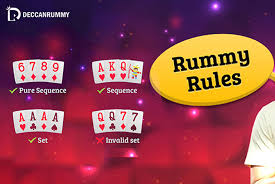Rummy Quick Rules, is a popular card game enjoyed by millions worldwide, known for its blend of strategy, skill, and a bit of luck. The objective is to form sets and runs from your hand of cards. This guide provides a quick overview of the essential rules to get you started on a standard Rummy game.
Objective
The main goal of Rummy is to arrange your cards into sets and runs. A set consists of three or four cards of the same rank but different suits (e.g., 7♦, 7♠, 7♣), while a run consists of three or more consecutive cards of the same suit (e.g., 4♥, 5♥, 6♥).
Setup
- Deck: Rummy is typically played with a standard 52-card deck. For larger groups or variations, two decks may be used.
- Number of Players: Rummy can be played with 2 to 6 players.
- Dealing: Each player is dealt 10 cards if there are 2 to 4 players, or 7 cards if there are 5 or more players. The remaining cards form the draw pile, with the top card placed face-up to start the discard pile.
Basic Gameplay
- Drawing Cards:
- At the start of your turn, draw one card from either the draw pile or the discard pile.
- Forming Melds:
- Organize your hand by forming sets and runs.
- You can lay down melds on the table during your turn.
- Discarding Cards:
- After drawing and possibly laying down melds, discard one card to the discard pile.
- The discarded card ends your turn.
- Going Out:
- The round ends when a player has formed all their cards into valid melds and discards their final card.
Scoring
- Melds:
- Melds are not scored individually during the game but are essential for winning the round by going out.
- Deadwood:
- Any cards not part of a meld are considered deadwood and carry point values:
- Face cards (K, Q, J): 10 points each
- Aces: 1 point
- Number cards: Face value
- The player who goes out scores the difference between their deadwood points and their opponents’ deadwood points.
- Any cards not part of a meld are considered deadwood and carry point values:
- Winning the Game:
- The game can be played over several rounds, with the first player to reach a predetermined score (e.g., 100 or 500 points) declared the winner.
Quick Tips
- Forming Melds Early:
- Try to form and lay down melds early to reduce deadwood and give yourself flexibility in managing your hand.
- Watching Opponents:
- Pay attention to the cards your opponents pick up and discard, giving you clues about their hands and strategies.
- Managing Deadwood:
- Keep your deadwood points low by discarding high-value cards that do not fit into your melds.
- Strategic Discards:
- Be mindful of the cards you discard, as you do not want to give your opponents useful cards to complete their melds.
Variations
There are numerous Rummy variations, each with its own unique rules and gameplay dynamics. Some popular variants include Gin Rummy, Indian Rummy, and Rummy 500. Each variant may have different rules for dealing, scoring, and forming melds, so it is essential to familiarize yourself with the specific rules of the variant you are playing.
Conclusion
Rummy is an engaging and versatile card game that offers a great balance of strategy and luck. By understanding these quick rules, you can start enjoying Rummy with friends and family. Remember, practice and experience will enhance your skills and enjoyment of the game. Gather your cards, invite some friends, and immerse yourself in the timeless fun of Rummy.




